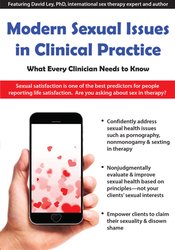

Many clients feel intense shame, guilt and moral conflict over sexual interests that are considered ‘abnormal.” Sexual concerns can have a drastic impact on a person’s mood, thoughts and overall mental health. Clinicians who don’t address sexuality in therapy are missing a critical component that would help their clients live happier lives and have healthier relationships.
Improve your client’s overall mental health and life satisfaction by integrating sexual health interventions into your practice!
In this recording, Dr. David Ley, PhD, walks you through the navigation of some of the most complex sexual issues that you’ll face as a clinician. You’ll walk away with the skills you need to address all of the issues below in therapy – and more!
Learn to effectively navigate issues of sexuality in your practice!
| File type | File name | Number of pages | |
|---|---|---|---|
| Manual - Modern Sexual Issues in Clinical Practice (7.81 MB) | 62 Pages | Available after Purchase |
David Ley, PhD, is a licensed psychologist and internationally-recognized expert on issues related to sexuality, pornography, and mental health. He has served as an expert consultant for numerous media outlets, appearing with Anderson Cooper, Katie Couric, Dr. Phil, Tom Ashbrook, and Dan Savage. He has also been interviewed in publications ranging from the LA Times to the London Telegraph, and he has published extensively in both the academic and pop realms of literature. His books, The Myth of Sex Addiction (2012) and Insatiable Wives (2009), were revolutionary explorations of sexual issues which blended a powerful client-centered narrative with a rich understanding of psychology, biology and sociology.
Dr. Ley has provided treatment around sexuality-related issues for over 20 years, ranging from treatment of sexual offenders to counseling alternative sexuality couples and individuals. He has consulted with treatment programs around the world about addressing sexuality issues in their treatment. At the same time, he is executive director of a large behavioral health and substance abuse outpatient program, and supervises treatment to thousands of patients every year. As a result, Dr. Ley is able to bring a broad, practical approach to help mental health clinicians effectively address sexuality-related issues.
Speaker Disclosures:
Financial: David Ley is executive director for New Mexico Solutions. He receives a speaking honorarium from PESI, Inc. He has no relevant financial relationships with ineligible organizations.
Non-financial: David Ley is co-chair of the New Mexico Youth Provider Alliance/New Mexico Behavioral Health Provider Association.
Please wait ...